In Poet's Corner, Tucson Poet Laureate TC Tolbert shows us several drafts and revisions of a poet's work, then speaks to that poet about the writing process.
Poet's Corner with Susan Briante
Draft 1
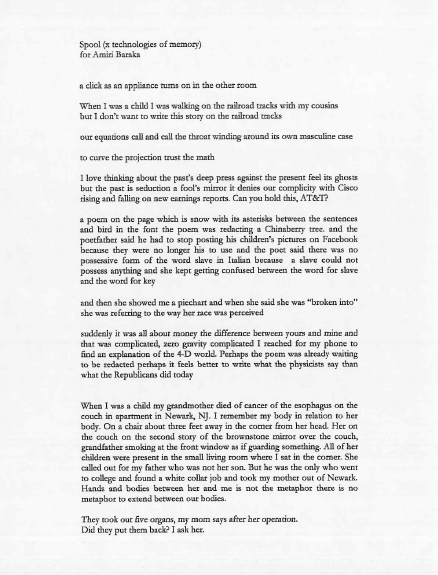
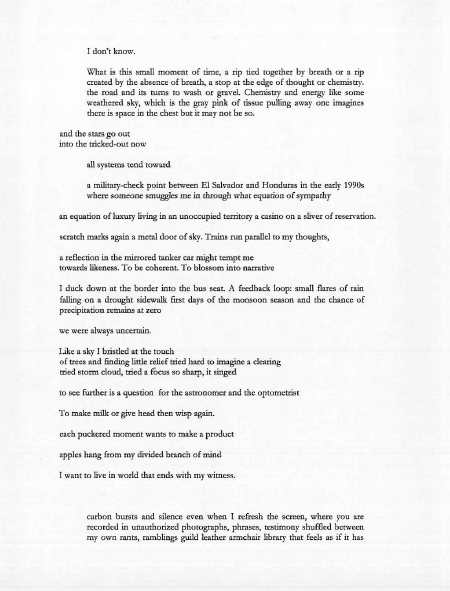
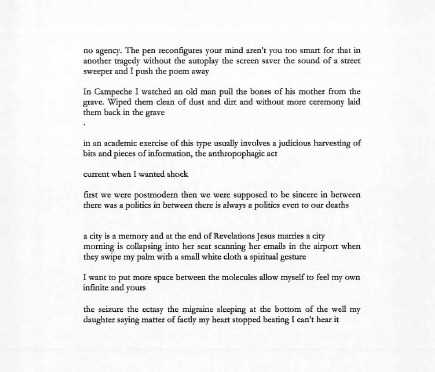
Draft 2
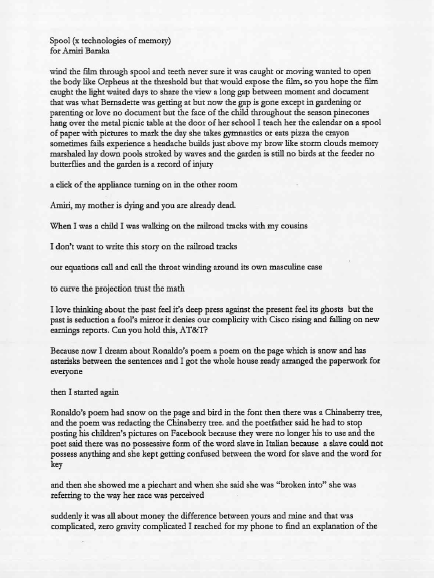
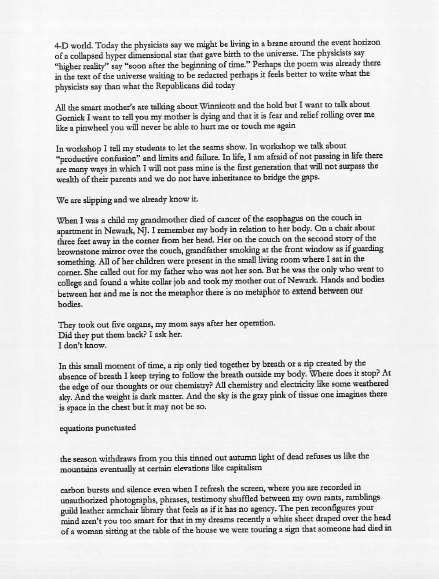

Draft 3
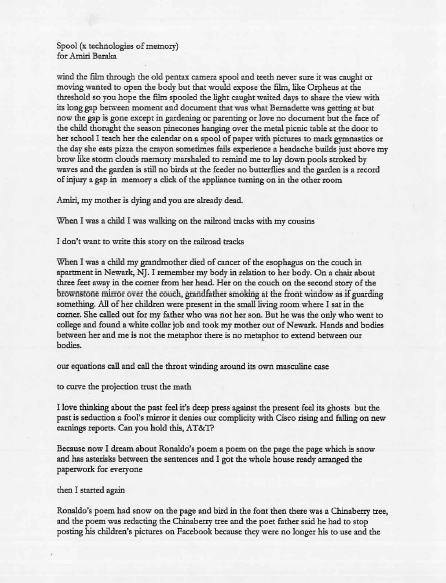
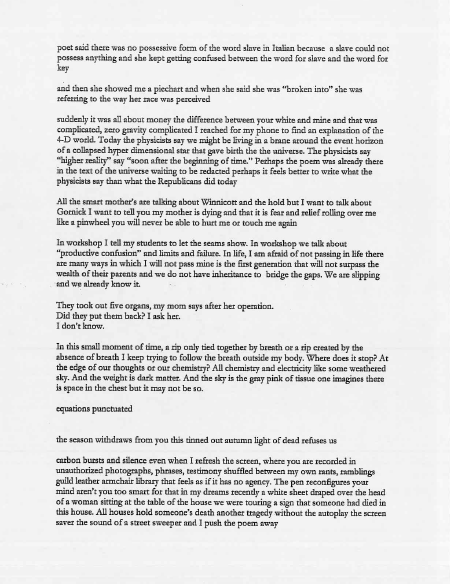
Draft 4
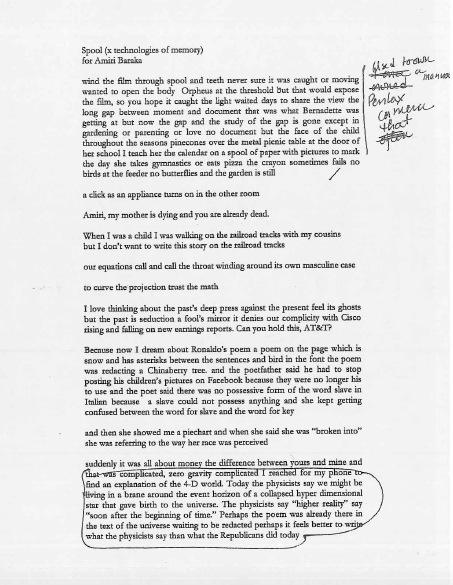
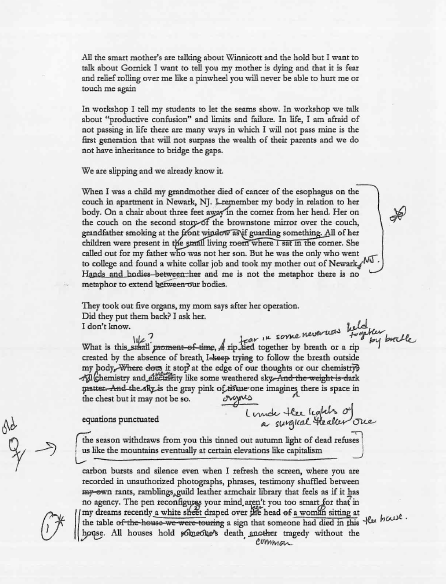
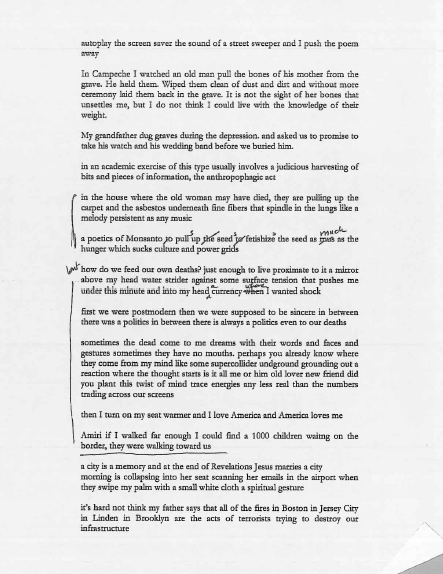
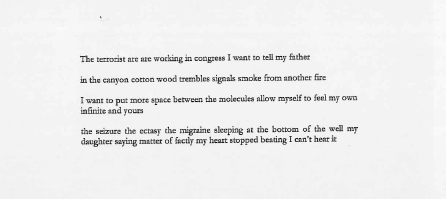
Final Draft
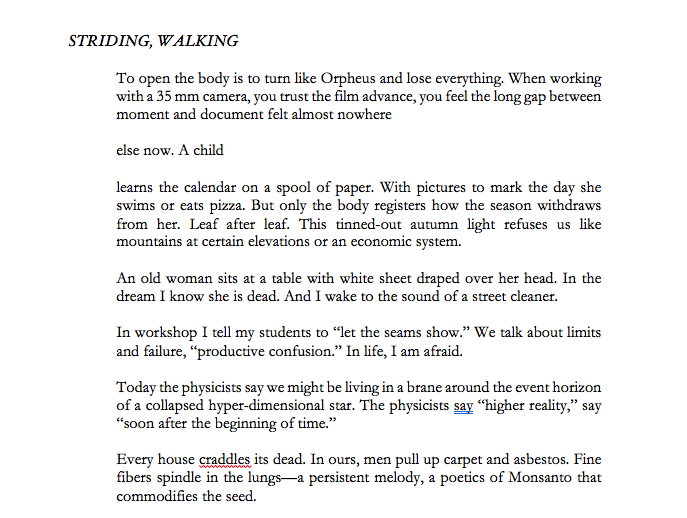
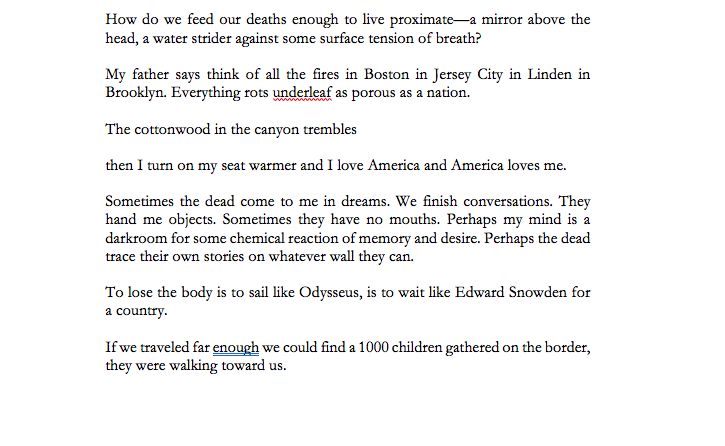
***
Questions and Answers for Poet’s Corner
TC Tolbert with Susan Briante
TC Tolbert: To begin, it is absolutely thrilling to see a poem change so dramatically from first to final draft – to see entire worlds created and/or articulated and then released as others move in (I’m thinking specifically of the narrative impulse(s) and many threads, even the dedication and address). Perhaps my first question is: Do your drafts typically make such large shifts and can you talk to me about that process? Does it feel as courageous as it looks and/or is there grief when a poem goes through this much change (and if so, how do you respond to/work with that grief) – what else do you experience as the poem is changing and how much control do you exert over this process? (“the past’s deep press against the present feel its ghosts”)
As I think I mentioned to you, one of my reasons for wanting to do this conversation series is to hear poets talk about their moments of trepidation, risk, and/or vulnerability – how they navigate those moments on the page (and off the page, if you are up for going there – truly, no pressure though, I can strike that part of the question!) – and to offer this as a resource for writers everywhere – an opportunity to see a poet work through that process, rather than just talk about it in abstractions. So please, do share as much detail as you wish about this poem’s life stages!
Susan Briante: Often the general process of making the poem looks very much like it does here…with the difference being that there were probably at least another two or three other versions between the last draft and final product that I just can’t find. Had I not come across these drafts, sort of accidentally, I don’t know if I could have spoken to the details of the process. I often forget a poem’s origin with the unfortunate result that I think they come out more fully formed than they actually do.
My notebook is a place of refuge. A place where I can write anything, where I sometimes go to record something or to riff off of something or to refine something. When I begin a poem from the notebook there’s usually a fragment or two that has some energy for me. I start culling the whole notebook for other notes that bounce off of those fragments. Other times, I just start copying what interests me from the notebook and then try to find connections or associations between the fragments, phrases, anecdotes, notes, then go back to the notebook and write some more.
In the summer of 2014, the editors of Bombay Gin reached out to ask if I would contribute a poem for a special section of the journal devoted to Amiri Baraka. (Baraka passed away in January 2014.) One of the first poems I memorized as a teenager was Baraka’s “Preface to a Twenty Volume Suicide Note,” which I found in an anthology I stole from a supply room in my New Jersey public high school. My mother and Baraka were high school classmates at another NJ public school, Barringer High School in Newark. In the summer of 2014, when I was writing this poem, my mother was dying. (She passed away in October of that year.)
I was thinking about death, memory and technology. I was thinking of my mother’s Barringer HS yearbook with its protective plastic sleeve and padded cover. It was a portal to the past for me, access to my mother as a teenager. I remember once looking for Baraka in those pages. I found out later he graduated a year ahead of her in school. She did not know him. I imagine their experiences of Newark, NJ, in the 1950s were very different. I was also thinking about my daughter who has never seen a camera that required film. I began (in what here is the second draft) writing about working with an old 35mm Pentax —the memory of wanting to check to see if the film was advancing but being afraid I’d expose the film. That image began to resonate against other images: bodies, corpses, seeing, Orpheus, underworld. Suddenly a dream—not the original dream in the earlier draft but another in which I saw woman draped in a sheet and knew she was dead—felt connected. Other connections and constellations begin appearing between images, and I started to write more explicitly around those connections.
TC: A corollary question is: in real hours, how long did this poem take to develop? (How many hours did it take to write draft one and then how much time passed between draft 1 and 2? Then, how long did draft 2 take and how much time passed, etc? How much time elapsed between draft one and final draft and/or publication? In some ways, this feels like a ridiculously dull line of questions but I find so many students really have no sense of the actual time a revision (or many revisions) can take. Maybe it’s social media where it seems like folks are spitting out poems every 5 minutes – I see a lot of pressure for poets to produce, produce, produce. Especially with the artificial pressure of deadlines in grad school, it can seem like 3 weeks from start to finish on a poem is standard but I don’t think that’s true for many writers outside of grad school. (“you feel the long gap between/ moment and document felt almost nowhere/ else now.”)
SB: Because I was writing over the summer, my recollection of the process was that it was fairly quick (at least by my standards). I’m guessing two to three weeks. Uninterrupted time allows me to revise on a faster time line. During the semester when I am teaching and going to meetings, my writing time gets reduced. And, often, when there’s long lags during which I can’t work and limited time to sink into the work, I think the poems can suffer. Or perhaps a better way to say that is: I suffer.
The first time I was awarded a residency (right after I finished my MFA) was the first time I could devote all of my attention to writing poems for a series of weeks without worrying about a job or coursework or teaching. And it was the first time I realized there’s a moment of real doubt that comes up every time I write a poem. A moment of: Is this really a poem? Is there enough on the page that’s exciting, surprising, interesting to me? Do I want to keep going? When I recognized that moment as part of the process, I stopped being afraid of it or looking at it as crisis. Unfortunately, when I’ve got less time to write and more gaps in between writing time, I can get stuck in that moment. And when you feel like weeks or even months go by and you are still not sure: Is it a poem? that can feel defeating.
Often when I am working on a draft of a poem, I have to abandon some original intention. I’ll save the draft as a new document I call “Working Title Fucking it Up.” I start that new document and title to release all the pressure (while still having the safety of the older draft), to give myself permission to go in a radically new direction, which is very frequently the right direction for the work.
TC: In the first draft we have here, towards the end, we read: “in an academic exercise of this type usually involves a judicious harvesting of bits and pieces of information, the anthropophagic act.” Did this piece begin as an academic exercise (and if so, which type – do you mean the act of writing a poem is an academic exercise or something else?)? Are poems, as we may experience them in the academy (or otherwise), exercises in eating oneself alive? Presenting oneself to be eaten by others?
And thinking about revision, how there is a certain amount of chewing and digesting and shitting that goes into the making of a poem – physically, yes, because we are in bodies but also metaphorically speaking – must a lyric poet be prepared to, if need be, cannibalize the self?
I guess what I really want to know is: where do poems begin for you? I mean this physically – do you keep a notebook, etc? And I also mean mentally, spiritually, psychologically, intellectually, somatically, etc. (I think so often of Lucille Clifton saying “Poems don’t come from what you know, they come from what you are trying to wonder about.”) How do you know you are writing a poem – is there a question you have taken up, a sound you are following, a point you are interested in wrestling, (any or all or none of these)?
Do your poems begin with work (“I need to do this b/c my job is a poet”) or do they begin somewhere outside of work (if that is possible – is it possible, in late stage capitalism)?
SB: As I mentioned this poem came out of a solicitation, but it was also what was in the air for me at that moment: Baraka’s death, my mother dying, memory and technologies of memory, legacies. For me the poem is always a negotiation between desire, inquiry and a willingness to be surprised. Even when I think I know what I am writing about, some level of association or speculation must be moving ahead of my thinking to keep the process interesting. Because if the writing process isn’t interesting—it’s a pretty good sign that the poem’s not going to be interesting. I don’t write to a particular ending or line. It’s never plotted out.
That’s why it feels so important to resist the idea of the poem as product—even though that’s the message of capitalism: everything is product, everything is commodity. I love this video by CA Conrad in which they explain that the poem had become “the factory” for them, that they were “treating it like an assembly line…” Conrad develops the somatic exercises to thwart the factory, to root the poem in experience, to put emphasis on process rather than product. That’s why I also love the work of Bhanu Kapil because her writing comes from performance or ritual, out of an effort to change one’s perspective whether by interviewing strangers (in The Vertical Interrogation of Strangers) or by lying down on a sidewalk in a West London town near the site of a 1979 race riot (in Ban in Banlieu). “How can the body perform something in a new way,” Kapil writes “something that belongs neither to the scene nor to history?”
My writing (thus far) has not come out of somatics or performances. My poems come out of thinking, perceiving, hopefully tuning myself to what resonates with me: a comment, an image, some small bit of sensory detail, a phrase, a quote, a problem, an inquiry, an obsession. They don’t come fully formed. But the process of being in the poem, of surrendering to the possibility of the poem, feels magical. Kristen Prevallet calls it “synchronous thinking.” For Selah Saterstrom, poetics is a kind of a divinatory practice. For me, the way in which something suddenly rises up from field of attention or distraction and announces itself: that’s the magic of the process, the sense that the process of writing the poem calls you (as the writer and later as a reader) into a knowledge that was not apparent before.
***
Susan Briante is the author most recently of The Market Wonders (Ahsahta Press), which the Kenyon Review calls “masterful at every turn.” Briante is also the author of the poetry collections Pioneers in the Study of Motion and Utopia Minus (an Academy of American Poets Notable Book of 2011). She is an associate professor of creative writing at the University of Arizona, where she coordinates the Southwest Field Studies in Writing Program, sending MFA students to the US-Mexico border to work with community-based environmental and social justice groups. Briante also produces and hosts the radio program Speedway and Swan, an hour of free-form poetry and music on KXCI 91.3 Tucson.
TC Tolbert often identifies as a trans and genderqueer feminist, collaborator, dancer, and poet but really s/he’s just a human in love with humans doing human things. S/he is Tucson’s Poet Laureate and author of Gephyromania (Ahsahta Press 2014), 4 chapbooks, and co-editor of Troubling the Line: Trans and Genderqueer Poetry and Poetics (Nightboat Books 2013). www.tctolbert.com

